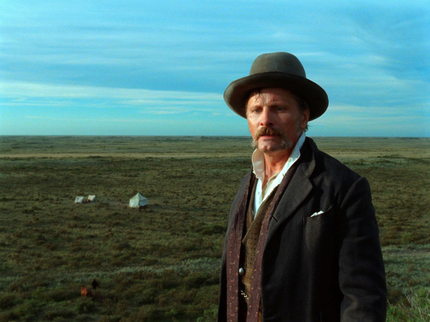Hamburg Filmfest Review 2014: JAUJA Is A Mystic Paradise Of Fiction

It is a change insofar as Alonso plunges a little bit more into narrative and gives more room for dialogue than in his previous work. The film is set at the end of the 19th century in the Patagonian desert. We observe a group of soldiers and surveyors who are fighting or have fought a war against indigenous inhabitants in order to conquer the land.
Mortensen is Captain Dinesen, an existentialist with a daughter named Ingeborg. They are Danish. She tells him that the void of the desert fills her. He tries to protect or of the greedy glances of his company.
Nevertheless she falls for one of them and runs off with him into the void. Dinesen knows about the dangers of the desert, dresses himself in a remarkable scene und follows them. Here Alonso gets into his auteuristic-terrain. Lonely men in beautiful, mysterious places, strange animals and happenings, solitude and silence.
An odyssey of hypnotic beauty emerges. With Alonso it is always about deformation: Something is not right, something which we cannot understand but which is fascinating to look at. Often the characters look at things very concentrated as if they need to figure out just like we do.
The slow movement of Dinesen on his horse through the desert is one of strange and dangerous happenings and meetings. Jauja is a film with a mesmerizing eye for space. There is always something going on in the background or off-screen, something that we try to grasp but never will.
Alonso is a filmmaker who shows the mysteries of cinema. Jauja is poetry of time and space, words and images. Somehow the film is closer to the work of Albert Serra than to his own previous films like La libertad or Los muertos. Both filmmakers have collaborated on a exchange dialogue project a few years back. An absurdist notion of contemplative strangeness unites them both.
It is not that Alonso's previous work was that different but in Jauja he plays a bit more with the audience. He is more cynic, more intellectual, more playful.
The film is also full of surprises and even twists. Jauja, which is the name of a lost paradise, is about the fiction itself. Alonso who was praised as one of the leading figures of a so-called nonfiction movement gives a dry and almost absurd comment to the fact that all films are fiction.
Not only does cinematographer Timo Salminen film in 4:3 aspect ratio with rounded edges but there are also different layers to the story told. It is almost a buñuelian dreamland. Characters will age, there will be music (composed by Viggo Mortensen himself), animals that miss us, not even the sky can be trusted. What a trip!

Do you feel this content is inappropriate or infringes upon your rights? Click here to report it, or see our DMCA policy.






